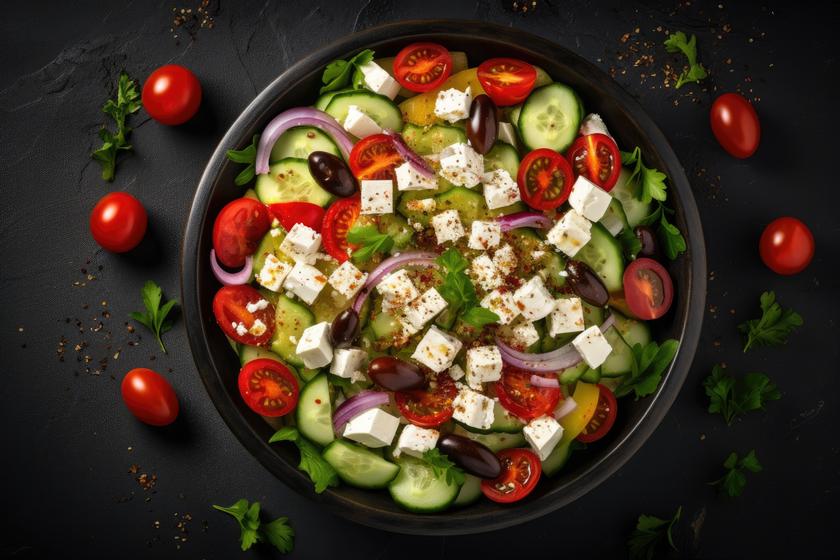What Is the Mediterranean Diet? (With Meal Plan Ideas & Tips for Getting Started)

You've likely heard about the Mediterranean diet enough by now to make you curious what all the fuss is about.
U.S. News & World Report has named it the best overall diet for six years in a row. It's also tied as the best diet for bone and joint health and the best family-friendly diet.
In addition, in an evidence-based analysis of 10 popular eating patterns, the American Heart Association gave the Mediterranean diet some of its highest marks. Only the DASH (Dietary Approaches to Stop Hypertension) diet received a better score.
If you're over "diet" trends, we don't blame you. But this isn't your usual diet. In fact, most dietitians don't even like calling it a diet.
"I encourage thinking of it more as a lifestyle," recommends Lea Obeid, a dietitian at Houston Methodist. "The Mediterranean lifestyle focuses on having well-balanced meals, seasonal fresh foods and a diversified eating pattern. It also incorporates other behaviors that are good for you like being physically active and participating in communal, shared experiences — eating dinner as a family, when possible, for instance."
What are the benefits of the Mediterranean diet?
Unlike the trendy diets that gain popularity as ways to quickly lose weight, the Mediterranean diet offers advantages beyond weight loss.
The benefits of following a Mediterranean lifestyle include:
- Lower risk of developing several health conditions, including heart disease, type 2 diabetes, stroke, cancer and more
- Improvements in blood sugar and cholesterol levels
- Help maintaining a healthy weight
"The Mediterranean 'diet' has been around for hundreds of years," explains Obeid. "It is based on the eating habits of people who live in countries bordering the Mediterranean Sea, including France, Lebanon, Italy, Morocco, Spain and Greece. Research shows that a Mediterranean-style eating pattern offers these numerous health benefits."
The items on the list above aren't trivial. These are some of the most common chronic health conditions affecting Americans. Evidence also suggests it may also improve cognition among older adults.
What is a Mediterranean diet?
The keto diet focuses on cutting carbohydrates. A paleo diet emphasizes eating like our ancestors. What does a Mediterranean diet consist of exactly?
"This lifestyle encourages diversifying your protein intake by including more plant-based protein, fish and shellfish, white cheeses, skinless chicken and limiting the amount of red meat," says Obeid. "It is also important to minimize the amount of processed foods during the week."
Obeid adds that the Mediterranean lifestyle promotes eating fruits and nuts as snacks and to satisfy your sweet tooth, as well as including non-starchy vegetables with your meals every single day.
"What I love about the Mediterranean lifestyle is that no food groups are excluded," adds Obeid. "The key is moderation."
The main foods of the Mediterranean diet include:
- Whole grains – such as whole wheat bread and pasta, brown rice, quinoa, bulgur, barley, farro and couscous
- Vegetables – prioritize non-starchy vegetables (dark leafy greens, bell peppers, mushrooms, carrots, broccoli and the like) over starchy vegetables (potatoes, corn, peas and squash)
- Fruits – aim for 2-3 servings per day
- Dairy – opt for unsweetened, low-fat products
- Beans and legumes – such as pinto, black, kidney and navy beans, red, brown and green lentils, chickpeas, split peas and black-eyed peas
- Nuts and seeds – including walnuts, almonds and cashews, nut butters (peanut, almond) and pumpkin, chia, flax and hemp seeds
- Fish and shellfish – aim for at least 3 servings per week
- Olive oil – moderation is key, limit to 4 Tbsp per day
"A Mediterranean lifestyle also emphasizes certain cooking methods over others," adds Obeid. "Baking, grilling, steaming, and boiling are preferred over pan frying or deep frying, for instance."
What foods are not allowed on the Mediterranean diet?
No foods are completely off limits when following a Mediterranean eating pattern, but the diet doesn't include processed food — which is why Obeid recommends minimizing their frequency.
"Be mindful of how much processed food you are eating during the week," says Obeid. "The goal is to reduce the amount of refined carbohydrates and saturated fats you are eating – replacing those saturated fats with healthy fats (monounsaturated fats and polyunsaturated fats) such as nuts and nut butters, seeds and vegetable oils."
Here are some more nuances to consider while following a Mediterranean diet:
- Aim to get between 3-6 servings of carbohydrates per day, but at least half of those servings should be whole grains instead of refined (simple) carbohydrates.
- Dairy can be consumed daily, but opt for plain low-fat yogurts, white cheeses and unsweetened milk
- Reduce red meat consumption to twice per week, instead incorporating more plant proteins, like beans, chickpeas, quinoa or lentils, and lean meats (like skinless chicken and tuna)
- Limit yourself to 1-2 portions of sweets per week, with fruits and nuts coming first
- Replace beer and liquor consumption with red wine
- Prioritize non-starchy vegetables over starchy ones, which include potatoes, corn, peas and butternut squash
How to start a Mediterranean diet
Adopting a Mediterranean eating pattern can sound overwhelming, especially if your busy lifestyle makes it hard to prepare fresh food. It can also sound challenging because we're not as familiar with the types of food and different recipes offered in a Mediterranean lifestyle.
"Start slow," says Obeid. "You don't have to change your diet overnight. Begin by trying the Mediterranean lifestyle principles that sound most achievable for you and go from there."
Here are Obeid's tips for starting to incorporate a Mediterranean lifestyle:
- Aim to have at least 1-2 servings of fruits and at least 3 servings of vegetables every day
- Flavor food with olive oil, herbs and spices instead of butter and salt
- Substitute ham and turkey for fresh grilled chicken while making a sandwich
- Make your own four-ingredient dressings (lemon, olive oil, plain Greek yogurt and salt)
- Use chickpeas (or any other type of beans) as the protein source in a salad
- Switch two of your usual red meat choices per week with fish, shrimp, beans, legumes or skinless chicken
- Add nuts and seeds when baking and sprinkle some on your salads
- Get creative with new Mediterranean diet recipes, like mdardra (rice and lentils garnished with caramelized onions) paired with a side salad
- Swap one of your sweet treats with your favorite fruit and a handful of nuts twice a week
Tips for making a Mediterranean diet meal plan
Looking for inspiration when meal planning? Here are some options Obeid recommends:
Mediterranean diet breakfast ideas
- Home-made mankoushe (any whole grain flat bread with either thyme mixed with olive oil OR mozzarella cheese baked for 5 minutes in the oven) paired with sliced tomatoes and cucumber
- Labne (yogurt cheese) or cottage cheese on a whole grain toast with tomatoes and herbs (oregano and basil)
- Avocado toast, made with whole grain bread, mashed avocado, tomato slices and egg
- Overnight oats or oatmeal prepared with milk and topped with fruits and nuts/seeds
Mediterranean diet lunch ideas
- Greek salad, made with leafy greens, cucumber, tomato, bell pepper, olives, feta cheese and tossed in an olive oil-based dressing (olive oil, lemon juice, salt)
- Lentils and rice with tabouli (salad of finely chopped parsley, tomatoes and onions)
- Bolognese paired with a side salad tossed in an olive oil-based dressing
- Italian beans or green beans cooked in marinara sauce with diced onions and a side of rice
Mediterranean diet snack ideas
- Banana slices topped with honey and peanut butter or almond butter
- Hummus and veggies
- Grapes and cheese with whole wheat crackers
- Popcorn (unbuttered or lightly buttered) with a cheese stick
Mediterranean diet dinner ideas
- Pasta tuna salad, made with canned tuna, whole wheat pasta, leafy greens, cucumber, shredded carrot and tossed in a 5-ingredient salad dressing (olive oil, lemon juice, plain Greek yogurt, mustard and salt)
- Savory omelet, made with mushrooms, tomatoes, bell pepper and paired with a slice of whole wheat toast
- Fassoulya (rice, minced beef and pinto beans) paired with a side salad tossed in an olive-oil based dressing
- Quinoa and halloumi salad, mixed with tomato, cucumber and bell pepper paired with avocado and grilled halloumi tossed in a 3-ingredient dressing (lemon juice, olive oil and salt)
By: Katie McCallum

















